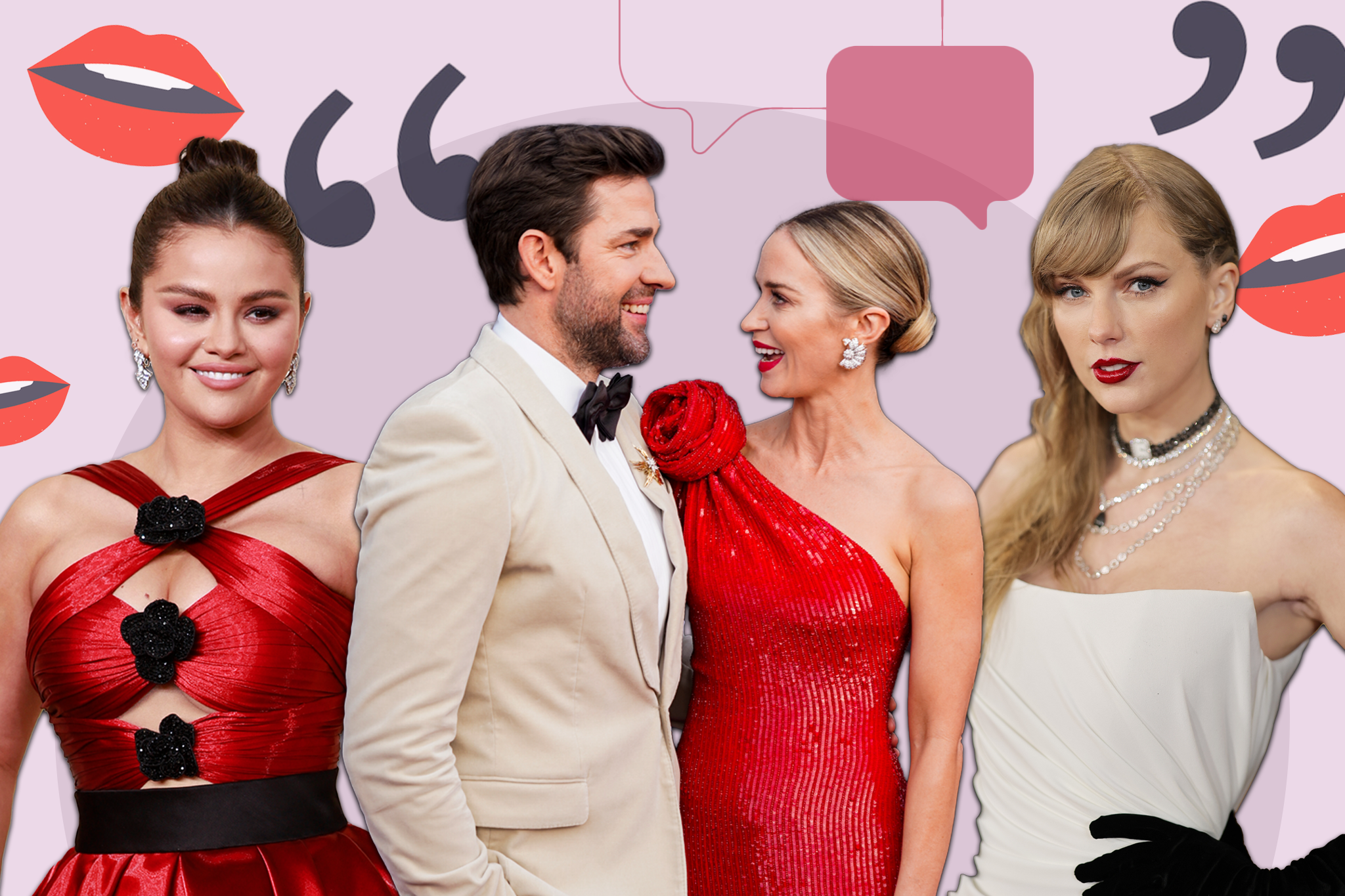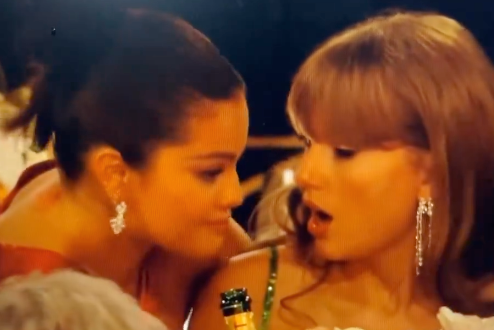The Independent's journalism is supported by our readers. When you purchase through links on our site, we may earn commission.
She said what?! How lip-reading stars like Taylor Swift has become TikTok’s most addictive trend
Footage of celebrities talking to each other sparks a rush to find out what amateur lip-readers think they’re saying. Annabel Nugent examines a gossip phenomenon and talks to the viral ‘lip-reading girl’


Your support helps us to tell the story
From reproductive rights to climate change to Big Tech, The Independent is on the ground when the story is developing. Whether it's investigating the financials of Elon Musk's pro-Trump PAC or producing our latest documentary, 'The A Word', which shines a light on the American women fighting for reproductive rights, we know how important it is to parse out the facts from the messaging.
At such a critical moment in US history, we need reporters on the ground. Your donation allows us to keep sending journalists to speak to both sides of the story.
The Independent is trusted by Americans across the entire political spectrum. And unlike many other quality news outlets, we choose not to lock Americans out of our reporting and analysis with paywalls. We believe quality journalism should be available to everyone, paid for by those who can afford it.
Your support makes all the difference.There are times when you come across a clip and you think to yourself: wow, to be a fly on the wall. It might be Charles nattering away to Camilla outside Buckingham Palace, Trump shaking hands with Putin, or Taylor Swift whispering in the ear of a confidante courtside at an NBA game – but you know it when you feel it: that irresistible urge to know what is being said.
Blame it on awards season, the fact the internet has made gossip hounds of us all, or the unprecedented access we have to our favourite celebrities thanks to social media, but that urge seems to be stronger than ever these days. And it’s given rise to a cottage industry of armchair lip-readers online who relay celebrities’ conversations in short videos that attract tens of millions of views. Being a fly on the wall is seemingly easier than ever; no Cronenberg-esque transformation necessary – just a special skill and a TikTok account.
The results are a mixed bag. At the Golden Globes last month, actor John Krasinski supposedly complained to his wife Emily Blunt that he “can’t wait to divorce” – or so said Kyle Marisa Roth of @thekylemarisa_, a celebrity gossip account with nearly 600,000 followers. Her interpretation was swiftly debunked by lip-readers on the platform and she apologised for her own “erroneous” lip-reading. “I’m a gossip activist, okay?” she joked. Also at the Globes, Selena Gomez was filmed dishing with Swift about two other A-listers. (The consensus among lip-readers of that particular conversation, though, holds water – despite Gomez protesting otherwise).
The most prominent lip-reader on TikTok is undoubtedly Nina Dellinger. The self-styled “lip-reading girl” has 1.3 million followers on the platform. She has decoded over 100 moments of soundless footage and her videos have accumulated more than 65 million likes and many more views.
The 26-year-old Dellinger was 16 when she realised she could read lips. It was during maths when she found herself tuned into a classmate’s conversation despite not being in earshot. She thought nothing of it until she joined TikTok in 2020 and thought it might be a fun thing to show off.
On her page, Dellinger lip-reads a range of mute moments: from politicians and influencers to leaked trailers and football games, but it’s her celebrity lip-reads that the people most want. Her video debunking the Krasinski-Blunt drama has 3.1 million views; her one of Beyoncé’s daughter Blue Ivy with Kylie Jenner, 6.3 million; and her clip of Jenner and Gossip Girl star Kelly Rutherford at fashion week, 11.8 million. Dellinger’s video deciphering the sweet nothings exchanged between Kylie Jenner and Timothée Chalamet has been seen by more than 14.5 million people.
“I think the main reason for the boom, unfortunately, is that when you’re a celebrity, people want to know about your life,” Dellinger tells me over Zoom from her home in Belize, where she moved from Southern California two years ago to start a cruise company. “And I think there’s something to be said about that – but there’s also something to be said about being a celebrity and gaining your money from having that sort of following.” There are two sides to the fascination, she says. “There’s the drama but I also think there are genuine fans of celebrities who want to see them succeed and want to see their families happy. So I guess there’s genuine care and then also easy, fast gossip. I, myself, try to stay away from that.”
Dellinger sets her own boundaries. In a video she posted revealing the details of a conversation between Olivia Rodrigo and Iris Apatow at a Los Angeles Lakers game, Dellinger omitted the name of the man Rodrigo appeared to be talking about. “If I read something that is too personal, too invasive, I absolutely won’t post that,” she says. “I’d never want to stir something up or imply something that could also turn out not to be true.” Dellinger says she routinely turns away requests from her followers asking her to decode a private conversation – like, say, a woman who suspects her boyfriend is cheating or vice versa.
Therein lies one of the biggest issues with lip-reading: it’s not an exact science. All over Dellinger’s account are disclaimers attesting to the fact that “ALL CONTENT IS ALLEGED”. It’s true that there’s a legitimacy to lip-reading that’s not shared by other tabloid fixtures like body language experts and outfit decoders, which probably has something to do with the presumption, albeit a false one, that you can fact-check it yourself.
On our call, Dellinger reminds me that the accuracy of lip-reading isn’t higher than 40 per cent on average. She says that she holds her videos to a much higher standard, though “If I don’t have a coherent picture of what they’re saying, I just won’t do it,” she says. “I’ll only ever do it if I have a phrase or sentence that I can fully read.”
Jeremy Freeman, 50, a forensic lip-reader based in Harrow, is similarly discerning with his work. Over the past decade, Freeman, who was born profoundly deaf and relies on lip-reading to communicate, has been called upon as an expert in cases of sexual assault, drug trafficking, and insurance fraud. He’s also provided his services for newspapers including the Daily Mail and The Sun. “Whether it’s Taylor Swift or a murder case, I treat it the same,” says Freeman. It’s for this reason that he won’t do live lip-reading; “I can take an hour to decipher 60 seconds of footage.”

“I always say it’s between 30 to 80 per cent,” he says when I ask about the accuracy of lip-reading. “Occasionally I can be 100 per cent convinced.” Context is everything: “pink elephant” and “big elephant” look the same to a lip-reader,” he explains, for example, “but only one reading makes sense in 99 per cent of scenarios. Take the footage from the Golden Globes of Gomez with Swift and actor Keleigh Sperry (who is married to Top Gun star Miles Teller) supposedly talking about Kylie Jenner and Timothée Chalamet. “The only other thing it could be in reference to is Timotei shampoo,” Freeman says. “And why would she be talking about shampoo in that context?”
Accuracy hasn’t always been the point – in fact, in the 2010s, it was the opposite of the point. Bad lip-reading, as popularised by the aptly named YouTube account Bad Lip Reading, reigned supreme. The anonymous producer behind the channel began making videos in 2011. His first – a dubbed-over version of Rebecca Black’s “Friday” that reimagined the hit song as a ridiculously silly, violent number called “Gang Fight” – has racked up 11 million views. Still, his numbers ticked up even more when he pivoted from dubbing pop songs to politicians. Rolling Stone described the channel as the “breakout hit” of the 2012 US presidential cycle, and it was featured on The Ellen DeGeneres Show. Today, he has 8.1 million subscribers on YouTube and 1.2 on TikTok where he still posts regularly.
Whether it’s Taylor Swift or a murder case, I treat it the same
Politicians were the perfect subjects, he tells me over the phone from his home in Texas. “It’s just funny to see people saying ridiculous things very earnestly. It looks very sincere and then to have this layer of nonsense applied over that, there’s this weird dissonance that we find funny.”
He first encountered lip-reading when his mum, then in her forties, suddenly lost her hearing. “She became brilliant at lip-reading to the point where she could hold a pretty solid conversation based on that alone and I was so impressed by that,” he says. By comparison, he was terrible at it. Hilariously so. “The mistakes were really funny, and I thought to myself, if I were in her position, I’d be taking in the world in such a surreal way.” And like that, Bad Lip Reading was born.
Ironically, he adds, having to constantly dream up funny non-sequiturs for his videos has actually made him quite good at genuine lip-reading now. “I may start to do more of the faithful attempts, but to me it’s just so much funnier when I’m making them say something absolutely ridiculous,” he says.
Lip-reading in earnest, though, is only becoming more popular. Freeman’s bread and butter are the royals – and the interest is insatiable. In 2018, he lip-read for media outlets covering the royal wedding. Last year, for Sky News, he lip-read the footage from Charles’s coronation, picking up the soon-to-be-king allegedly grumbling about never being on time as he and Camila arrived at Westminster Abbey early and Prince Harry reportedly complaining about how he is treated.
Like Dellinger, Freeman has limits to what he will lip-read. “The way I see it is if the TV cameras are there and if the general public are there then it’s not an issue because that’s what journalists do,” he says. “But if I were given a lip-reading clip taken in the privacy of someone’s home, I wouldn’t do that because it’s an ethical thing – unless it were a police matter or a security matter.” Freeman has turned down several jobs like these.
For her part, Dellinger says she simply doesn’t agree with followers who question her integrity. “When people ask me, ‘Well, don’t you feel you’re invading their privacy? Don’t you feel this isn’t appropriate?’ My honest answer is no, I don’t – because they know they’re being filmed first of all. And second of all, there are people who are hard of hearing and who use lip-reading every day,” she says. “I equate it to how you would not speak loudly in public about a conversation that’s sensitive.”
Their jobs are bound to get harder in coming months; the celebrities are cottoning on. Just last month, Saltburn star Jacob Elordi and singer Renée Rapp poked fun at the trend in a skit on Saturday Night Live. Gomez and Blunt seemed also to be referring to their respective viral lip-reading moments when they were photographed together at a post-Globes awards show covering their mouths. Footballers have long used the cover of their sweaty palms to hide their speech, and it seems celebrities may very well be following suit – albeit with a lot more panache. At the Grammys this month, Swift accessorised with a black lace fan – all the better to strategically hide her lips. Oddly enough, though, “the royals don’t seem to have caught on”, Freeman says happily.
Join our commenting forum
Join thought-provoking conversations, follow other Independent readers and see their replies
Comments